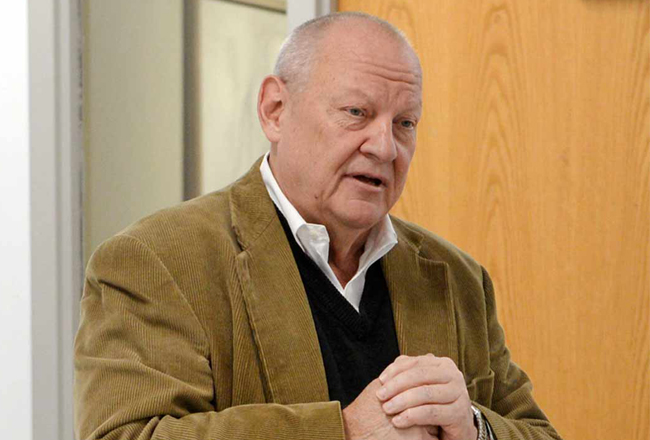
Connecticut may have a new-ish governor, but it”™s still facing the same stubborn problems that it has for years, according to a new book by Gary L. Rose, professor and chair of the Department of Government at Sacred Heart University.
As its title suggests, “Connecticut in Crisis: Policy Challenges and the 2018 Contest for Governor” (Academica Press) doesn”™t just recap the gubernatorial race but also examines five key, nagging problems: the perception of Connecticut as a state that is generally inhospitable to business; the heavy tax rates imposed on residents and private companies; cities strongly in need of revitalization; a crumbling infrastructure; and the negative effect that entitlements have upon the state budget.
“There are a number of crises the state is facing,” Rose declared. “Taxation is a huge issue ”“ we”™re one of the most heavily taxed states in the country, which is one of the reasons that business is down in Connecticut.”
The author of 10 other books ”“ including the weighty, 800-page “Haywire: A Chronology of the 2016 Presidential Contest” (Ox Bow Press) ”“ said that entitlements, in the form of the state”™s multi-year pacts with the State Employees Bargaining Agent Coalition (SEBAC) and the Teachers Retirement System (TRS), are especially onerous, with $21.2 billion and $13.1 billion in unfunded liabilities, respectively.
“People are entitled to their pensions,” Rose said. “But tax reform and dealing with the unions are still things (Gov. Ned Lamont) needs to address in a meaningful way.”
An agreement reached in July with SEBAC that Lamont said represents “significant strides that are stabilizing our state”™s finances and addressing our fixed costs” is “a step in the right direction,” Rose said.
Connecticut”™s infrastructure was the one big surprise Rose found when researching the book. “I did not know how bad it was,” he said. “All the consulting firms agree that our roads and bridges are absolutely the worst in the country.” As for Lamont”™s controversial plan to return tolls to Connecticut”™s highways to help pay for those needed improvements, which once appeared to have support from the governor”™s fellow Democrats as well as the general public, Rose said momentum appears to have, at best, stalled.
The governor didn”™t do himself any favors by “flip-flopping on the issue,” Rose said, referring to Lamont”™s change from tolling only trucks to all vehicles. “The governor has to be very sensitive to the tolls question. It”™s counter to what most people want in Connecticut. And the public is perfectly justified in wondering whether that money (up to $800 million in annual revenue, according to Lamont) will really be kept in the so-called ”˜lockbox”™ for the Special Transportation Fund, or if it will somehow be diverted to cover other costs, as has happened in the past.”
With the Legislature having failed to vote on tolls during its regular session, Lamont has called for a special session to consider the issue. Though he posited such a session could take place in July during an address to the Business Council of Fairfield County earlier this summer, no such plans have been formally announced.
“There”™s a growing feeling that tolls are not the panacea that the Democrats claim it will be,” Rose said.
The professor also calls for a revitalization of Connecticut”™s cities, “which are in terrible shape, no question about it.”
Lacking what he called “major cities,” Rose said the state”™s midsized cities may not be what members of the younger generation are looking for.
“My own students represent an urban population that doesn”™t want to get a house and live in the suburbs,” he said, “and that, along with our not being more hospitable to businesses and the taxes, are what”™s driving people leaving the state.”
Rose pointed to a recent survey conducted by the Connecticut Economic Research Center that found 47% of respondents saying they”™d likely move out of the state within the next five years.
Regarding the election, Rose said that while he did not interview Lamont or Republican challenger Bob Stefanowski for his book, he served as a panelist at three of the debates held before the Nov. 6 election.
“I wondered why … someone would want to be governor of Connecticut, given the number of problems plaguing the state,” he said of the initial field of 20.
Up to the eve of the election, Rose said, he was uncertain which candidate would be elected.
As to whether his next endeavor will be writing about the 2020 presidential election, Rose laughed.
“It”™s time for me to take a little break from writing,” he said.






















